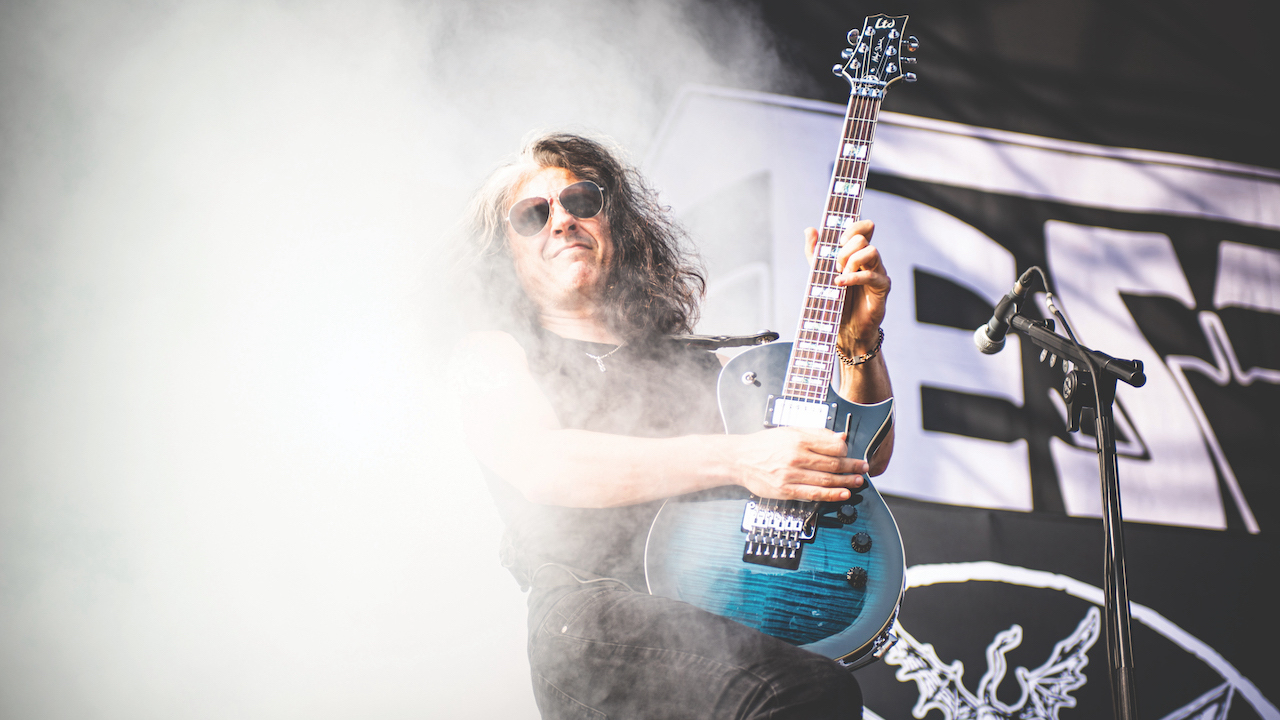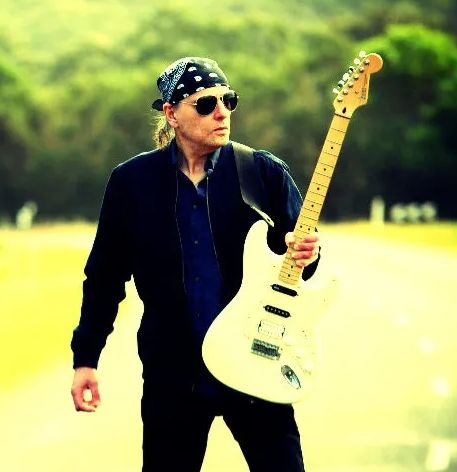“There was suddenly no sound. I was on stage all on my own. And this was a heavy metal concert, so the crowd was starting to chant and boo”: Alex Skolnick reveals his most embarrassing onstage moment
The genre-hopping Testament guitarist on his first gigs, favorite guitar, and why solidbodies feel more replaceable than hollowbodies

What was your first guitar?
“It was a classical guitar that I got very cheap at a garage sale. It was very difficult and challenging to play. I was about 10 when I got it, and it lasted about two years. Then I got an electric guitar that looked like an imitation of a Teisco Del Rey, and which was so thin, you could probably break it with one hand!”
What was the first song you learned to play on the guitar?
“The first full song I learned was Act Naturally by the Beatles, as sung by Ringo Starr, which is almost a country song. Before that, the first thing I learned on a guitar was the riff to Day Tripper, also by the Beatles. I learned how to play the notes by figuring out how to play it down by the bridge of the guitar, which gave it that surf quality.
“That was one of the first experiences that gave me the confidence to think that playing guitar was something I could do and potentially be good at. But at the time, I still didn’t know the chords to Day Tripper.”
What was your first gig?
Don’t try to sound too much like anybody else. It’s a lesson you can’t learn early enough
“I did my first gig with a band I still play with today, Testament, though the band was called Legacy back then. They already had a show booked at a venue that’s become pretty legendary – Ruthie’s Inn in Berkeley.
Get The Pick Newsletter
All the latest guitar news, interviews, lessons, reviews, deals and more, direct to your inbox!
“At the time, though, we thought it was a place nobody was going to remember in 10 or 20 years, yet it went on to become a storied venue. The show was already on the calendar and the original guitar player had left the group, so there was a lot of pressure on me. But it was a very good incentive to improve my playing skills very quickly.”
Ever had an embarrassing moment on stage?
“There was one time in the late ’80s, during one of the first tours with Testament. We were doing an open solo segment where I’d play for a few minutes by myself. One night as I was playing, there was suddenly no sound!
“Usually when that happens, the first thing you do is check the cable and the amp, but everything was working. Eventually, we found the problem; the pickup had shorted out.
“Here I was there on stage all on my own, not knowing what to do. And this was a heavy metal concert, so the crowd was getting antsy and starting to chant and boo. The band came back on, we switched guitars and moved on – but at the time it was really, really embarrassing.”
What’s your current favorite piece of gear?
“My 1976 Gibson L-5. I don’t gig with it because it’s one-of-a-kind and has a lot of sentimental value. But I’ve written a lot of songs on that guitar, songs I never expected I’d write. I normally think of it as something to play and to practice jazz on.
“The guitar is from a time where the quality was really strong, so you can just play it as is; it has a great tone too. It’s been with me through thick and thin, through several years of my life and through different musical projects.”
The building is burning down. What single guitar from your collection would you save?
“It would be that L-5. It’s interesting because I’m better known for solidbody electrics, but you know what? Those feel more replaceable somehow, while that guitar feels very irreplaceable.
“There’s also another guitar I got about a year ago, a 1935 Gibson L-00 parlor guitar. It’s just amazing. I almost always come up with a song idea on that guitar. Having said that, I’d probably grab both guitars – one in the case, and one in my hand.”
When was the last time you practiced?
“Last night, to prepare for all the shows I’ll be doing this year, focusing particularly for a show of instrumental music I’ll be doing with Stu Hamm and Chad Wackerman. It is clearly the most challenging show this year, so I was going over a song called Katahdin, which was originally on a recording with Stu, Steve Smith and Frank Gambale [The Light Beyond, 2000].”
What aspect of the guitar would you like to be better at?
“One thing I’m working on a lot lately is playing unaccompanied. In the whole first period of my professional experience, I was playing with a band, and I got used to the idea that there was always going to be a drummer.
”Then, as I got more interested in improvisation, I discovered more players who had a strong enough sense of rhythm and harmony to play unaccompanied while still [keeping] the music listenable. It’s taken a while, but it’s something I work on often, and there’s been a noticeable improvement.”
What guitar-centric advice would you give your younger self if you had the chance?
“Don’t stress, don’t try to keep up with anybody else, and don’t try to sound too much like anybody else. It’s a lesson you can’t learn early enough.”
Joe Matera is an Australian guitarist and music journalist who has spent the past two decades interviewing a who's who of the rock and metal world and written for Guitar World, Total Guitar, Rolling Stone, Goldmine, Sound On Sound, Classic Rock, Metal Hammer and many others. He is also a recording and performing musician and solo artist who has toured Europe on a regular basis and released several well-received albums including instrumental guitar rock outings through various European labels. Roxy Music's Phil Manzanera has called him, "... a great guitarist who knows what an electric guitar should sound like and plays a fluid pleasing style of rock." He's the author of Backstage Pass: The Grit and the Glamour.



![[from left] George Harrison with his Gretsch Country Gentleman, Norman Harris of Norman's Rare Guitars holds a gold-top Les Paul, John Fogerty with his legendary 1969 Rickenbacker](https://cdn.mos.cms.futurecdn.net/TuH3nuhn9etqjdn5sy4ntW.jpg)







